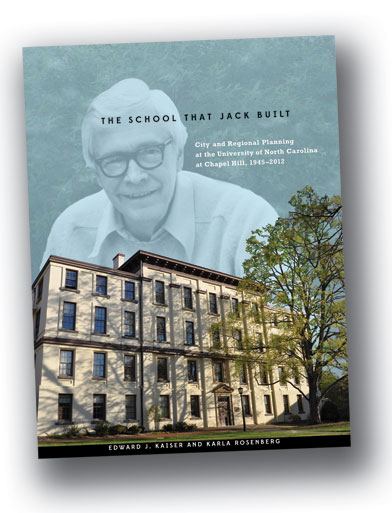Department History
Founded in 1946, the Department of City and Regional Planning is one of the largest, oldest, and best known programs for graduate planning education and research in North America. We are located in a historic building in the heart of the country’s oldest state university, the University of North Carolina at Chapel Hill. The state of North Carolina, the Research Triangle region, and the community of Chapel Hill are ideally suited to serve as the home base of a nationally ranked program in city and regional planning. We were the first planning department established with a base in the social sciences rather than in architecture or landscape design and have retained and strengthened that legacy through the multidisciplinary research and teaching programs of our faculty.
The concepts of sustainable development and social justice as goals of planning remain central to our mission. Whether the objectives are improved physical, social, economic, or environmental conditions, or more efficient and equitable policies, programs and environments, planning is a way of effectively marshalling resources to public development objectives. The professional planner combines an understanding of urban and regional theory grounded in a spatial context and a grasp of planning and management methods to guide development in the public interest.
Carolina Planning actively works toward increased diversity and inclusion of students, faculty, and ideas from marginalized communities, including but not limited to:
- Providing funding support opportunities in the form of an Excellence in Diversity Fellowship
- Fostering opportunities to learn from international contexts inside and outside the classroom
- Curricula review on the basis of intellectual diversity as well as authorship representation
- Regularly facilitated workshops and events promoting racial equity
- The creation of Plan For All, a student-led group dedicated to issues of department equity, diversity, and inclusion
These department initiatives, supplemented by formal and informal organizing amongst students over matters of ethnicity, gender, environmental racism, and LGBTQ identity, lead to department-wide familiarity with issues spanning a diverse set of populations.
The Department of City and Regional Planning welcomes students, faculty, staff, and all visitors regardless of race, religion, gender identification, sexual orientation, age, or disability status. The more reflective of society’s diversity the department is, the better we are.
Our mission, vision and values:
Mission
Discover. Educate. Inspire…to produce innovative, equitable, and transformative planning practice.
Vision
Values
- High-impact engaged social science
- Diversity & Inclusion
- Career-launching mentorship & teaching
Strategic Plan
Our Strategic Plan outlines DCRP’s priorities.
The School That Jack Built
A comprehensive, entertaining history of Carolina’s city and regional planning department, which was the seventh planning program in the country, first in the South, and the first to be based in the social sciences.
The 186-page book, The School That Jack Built: City and Regional Planning at the University of North Carolina at Chapel Hill 1945-2012 by Edward J. Kaiser ’66 and Karla Rosenberg ’12, is peppered with observations and anecdotes by alumni and faculty, along with 100 photos of people, occasions and places. The co-authors started working on the book in 2010, culling through boxes of materials including scrapbooks, photos and course catalogues, as well as interviewing faculty and alumni.
The “Jack” in the title is Jack Parker, a native of Novia Scotia who was hired in 1945 to start a planning program at UNC before he had even finished his own master’s degree at MIT. He led the department until his retirement in 1974, and continued as an informal adviser to faculty and alumni for another 25 years.
Co-author Kaiser, who graduated from UNC’s doctoral planning program and then taught there for 35 years, called Parker “a people person.”
“He was very interested in people and their aspirations, and began mentoring students while recruiting them to UNC, continuing through their tenure at Carolina and, for many alumni, well into their careers,” Kaiser said. “He was known for having parties in his backyard garden (a photo of the Ransom Street garden is pictured on page 20), and he would encourage students, asking them, ‘What do you want to do in life?’ He did that well into the 1990s.”
Co-author Rosenberg, who has a master’s in social work and city and regional planning from UNC, is interested in pursuing a career in historic preservation. She said the program’s placement in the social sciences sets it apart and makes it special.
“We refer to a quote in the book about how the program really needed to be in a place that emphasizes critical thinking and the humanities, because you are dealing with people and not just hard infrastructure,” she said. “I think that has been really good for the department — that openness to people from different backgrounds — business, architecture, even biology. We can all bring something to the table.”
Digital version (note: due to file size, this is a low resolution version)
